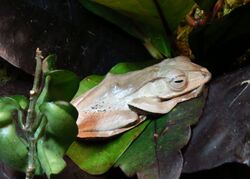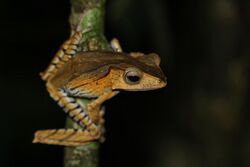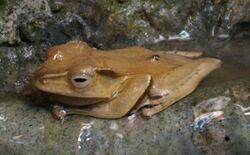Biology:Polypedates otilophus
| Borneo eared frog | |
|---|---|

| |
| Scientific classification | |
| Domain: | Eukaryota |
| Kingdom: | Animalia |
| Phylum: | Chordata |
| Class: | Amphibia |
| Order: | Anura |
| Family: | Rhacophoridae |
| Genus: | Polypedates |
| Species: | P. otilophus
|
| Binomial name | |
| Polypedates otilophus (Boulenger, 1893)
| |
| Synonyms[2] | |
|
Rhacophorus otilophus Boulenger, 1893 | |
Polypedates otilophus (also known as the file-eared tree frog,[2][3] Borneo eared frog, or bony-headed flying frog[4]) is a species of frog in the family Rhacophoridae. It is endemic to Borneo where it is widespread and found in Brunei, Indonesia, and Malaysia,[2] typically in the lowlands but sometimes as high as 1,100 m (3,600 ft) above sea level.[3] This species has prominent, sharp ridges behind the eye, above the ear, referred to in its names.[3][4]
Taxonomy
Polypedates pseudotilophus from Sumatra and (probably) Java was included in this species until 2014.[2]
Description
Males measure up to 80 mm (3.1 in) and females up to 100 mm (3.9 in) in snout–vent length.[3] The body is robust and dorsally lemon yellow in color, with many thin, black stripes; also the thighs have many black bars. The tympanum is conspicuous, with a serrated bony crest above it (the "ear"). Fingertips are expanded into large discs; those on the toes are smaller. The fingers have only rudimentary webbing whereas the toes are moderately webbed.[5] The tadpoles are yellowish green above and white below, acquiring the stripes seen in adults well before metamorphosis.[5] The largest tadpoles are 60 mm (2.4 in) in total length.[3]
Habitat and conservation
Polypedates otilophus typically occurs in secondary habitats, at the edges of primary forest, and also in villages.[5] They are most easily spotted at suitable breeding ponds where adults perch on vegetation 1–4 m above the ground.[3] It is not considered a threatened species by the IUCN.[1]
References
- ↑ Jump up to: 1.0 1.1 IUCN SSC Amphibian Specialist Group (2018). "Polypedates otilophus". IUCN Red List of Threatened Species 2018: e.T79102536A79102366. doi:10.2305/IUCN.UK.2018-1.RLTS.T79102536A79102366.en. https://www.iucnredlist.org/species/79102536/79102366. Retrieved 15 November 2021.
- ↑ Jump up to: 2.0 2.1 2.2 2.3 Frost, Darrel R. (2016). "Polypedates otilophus (Boulenger, 1893)". Amphibian Species of the World: an Online Reference. Version 6.0. American Museum of Natural History. http://research.amnh.org/vz/herpetology/amphibia/index.php//Amphibia/Anura/Rhacophoridae/Rhacophorinae/Polypedates/Polypedates-otilophus.
- ↑ Jump up to: 3.0 3.1 3.2 3.3 3.4 3.5 "Polypedates otilophus (File-eared Tree Frog)". Frogs of Borneo. 2016. http://www.frogsofborneo.org/rhacophoridae/291-rhacophoridae/polypedates/otilophus.
- ↑ Jump up to: 4.0 4.1 Dub (30 January 2014). "Borneo Eared or Bony Headed Flying Frog". frogs.cc. http://frogs.cc/borneo-eared-bony-headed-flying-frog/.
- ↑ Jump up to: 5.0 5.1 5.2 Inger, R.F. (1966). "The systematics and zoogeography of the amphibia of Borneo". Fieldiana Zoology 52: 326–329. doi:10.5962/bhl.title.3147.
Wikidata ☰ Q2701156 entry
 |




